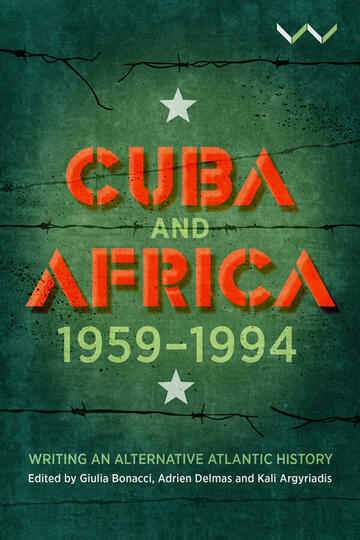Cuba and Africa, 1959–1994
Writing an Alternative Atlantic HistoryContributor(s): Adrien Delmas, Bernardo J. Capamba André, Charlotte Grabli, Christine Hatzky, Delmas Tsafack, Elina Djebbari, Emmanuel Alcaraz, Giulia Bonacci, Héloïse Kiriakou, João Felipe Gonçalves, Kali Argyriadis, Michel Luntumbue, Pablo Rodríguez Ruiz, Shamil Jeppie
- Publication Date: November 2020
- Dimensions and Pages: 234 x 156 mm; 344pp; 14 Black and white Figures
- Paperback EAN: 978-1-77614-633-8
- eBook EAN: 978-1-77614-635-2
- PDF EAN: 978-1-77614-634-5
- Rights: World
- Recommended Price (ZAR): 420.00
- Recommended Price (USD): 35.00
This collection provides an understanding and an explanation of Cuba’s interaction with
Africa between 1959 and 1994, beginning with the Cuban Revolution and ending with South
Africa’s democratic election. Excitingly, these essays reflect understandings of the Cuba–
African nexus from a range of disciplinary nodes. This is interdisciplinary scholarship in a real
and symbolic way – and at its most interesting too.
— Peter Vale, Senior Fellow, Centre for the Advancement of Scholarship, University of Pretoria
Cuba was a key participant in the struggle for the independence of African countries during the Cold War and the defi nitive ousting of colonialism from the continent. Beyond the military interventions that played a decisive role in shaping African political history, there were many-sided engagements between the island and the continent.
Cuba and Africa, 1959-1994 is the story of tens of thousands of individuals who crossed the Atlantic as doctors, scientists, soldiers, students and artists. Each chapter presents a case study – from Algeria to Angola, from Equatorial Guinea to South Africa – and shows how much of the encounter between Cuba and Africa took place in nonmilitaristic fields: humanitarian and medical, scientific and educational, cultural and artistic.
The historical experience and the legacies documented in this book speak to the major ideologies that shaped the colonial and postcolonial world, including internationalism, developmentalism and South–South cooperation.
Approaching African–Cuban relations from a multiplicity of angles, this collection will appeal to an equally wide range of readers, from scholars in black Atlantic studies to cultural theorists and general readers with an interest in contemporary African history.
Figures and Table
Foreword by Shamil Jeppie
Acknowledgements
Acronyms and Abbreviations
Timeline of Historical Events
Map of Africa, 1994
Introduction: Reconfiguring the Cuba-Africa Encounter – Kali Argyriadis, Giulia Bonacci and Adrien Delmas
PART I: POLITICS AND SOLIDARITY
Chapter 1 Cubans in Algiers. The Political Uses of Memory – Emmanuel Alcaraz
Chapter 2 Cuban policy and African Politics. Congo-Brazzaville and Angola, 1963-1977 – Héloïse Kiriakou and Bernardo J.C. André
Chapter 3 Motivations and Legacies of the Cuban Presence in Equatorial Guinea from 1969 to the Present – Delmas Tsafack
Chapter 4 Cuban internationalism in Africa. Civil Cooperation with Angola and its Aftermath – Christine Hatzky
PART II: TRAJECTORIES
Chapter 5 The Experience of a Multidisciplinary Research into Angola’s National Question: Anthropology in a War Context – Pablo Rodríguez Ruiz
Chapter 6 Cuban-Congolese Families: From the Fizi-Baraka underground to Havana – Michel Luntumbue
PART III: VOICES
Chapter 7 Atlantic Voices: Imagination and Sound Dialogue between Congolese and Cuban singers in the 1950s – Charlotte Grabli
Chapter 8 Cultural Diplomacy in the Cold War: Musical Dialogues between Cuba and West Africa, 1960-1970 – Elina Djebbari
PART IV: RECONSTRUCTING HISTORY, RECONNECTING ROOTS
Chapter 9 The Construction of a Spiritual Filiation from Havana to Ilé-Ifé – Kali Argyriadis
Chapter 10 The Island, the Peninsula, and the Continent: Cuban American Engagements with Africa – João Felipe Gonçalves
Contributors
Index
Editors:
Giulia Bonacci is a historian and researcher at the Institute of Research for Development, and is posted at the Migrations and Society Research Unit (URMIS), University of Côte d’Azur.
Adrien Delmas is Director of the Centre Jacques Berque in Rabat and an associate researcher at the Institut des Mondes Africains, Paris.
Kali Argyriadis is an anthropologist and researcher at the Institute of Research for Development, and is posted at the Migrations and Society Research Unit (URMIS) at University Paris Diderot.
Contributors:
Emmanuel Alcaraz , Bernardo J. Capamba André, Kali Argyriadis, Giulia Bonacci,
Adrien Delmas, Elina Djebbari, João Felipe Gonçalves, Charlotte Grabli, Christine Hatzky,
Héloïse Kiriakou, Michel Luntumbue, Pablo Rodríguez Ruiz, Delmas Tsafack,
Shamil Jeppie.
This collection provides an understanding and an explanation of Cuba’s interaction with
Africa between 1959 and 1994, beginning with the Cuban Revolution and ending with South
Africa’s democratic election. Excitingly, these essays reflect understandings of the Cuba–
African nexus from a range of disciplinary nodes. This is interdisciplinary scholarship in a real
and symbolic way – and at its most interesting too.
— Peter Vale, Senior Fellow, Centre for the Advancement of Scholarship, University of Pretoria



